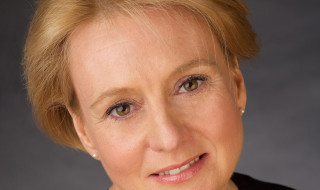Chief dental officer for England, Sara Hurley, speaks to Julian English about her life, her role, oral health and Melchester Rovers.
Sara Hurley, as chief dental officer for England, operates from the headquarters of NHS England at Skipton House, London. This new arrangement for the chief professional officers (CPOs) came into being during the tenure of her predecessor, Barry Cockcroft.
With the transition of the CPO from the Department of Health (DH) in Whitehall, Westminster to Skipton House, Elephant and Castle, a new approach for working was required. This is still a developing area but Sara sees this as an opportunity, not a threat, and is clearly exploiting all the opportunities for cross-domain working. With a portfolio of advisory responsibilities that expands well beyond the NHS England footplate, she maintains strong ties to Health Education England, overseeing workforce development and integrating oral health education into the wider NHS workforce, links to the CDOs in Scotland, Wales and Northern Ireland, as well as with policymakers in the DH.
What’s Sara’s role?
In her capacity as NHS England’s clinical policy development lead she has a key role in advising NHS England commissioning teams on how they may best meet the oral health and dental care needs of England. As CDO, she has a seat at the various strategic oversight groups for commissioning primary care and notes that there is increasingly a better recognition of the unique commissioning challenges that face NHS dental care.
Sara is clear that her ambition is to raise dentistry up the agenda and in the first few months of lobbying she senses that there is increasing understanding of the unique contribution that the dental profession makes to overall health. The pretty much constant 3% NHS England spend is on commissioning dentistry as opposed to ‘broader oral healthcare and wider health improvement’. A fundamental difference – but one that is not widely appreciated.
Sara is keen that NHS England understands the high value health outcomes that can be achieved by using more innovative models for commissioning, as well as thinking outside the ‘dentistry’ element of the primary care budget. Clearly an investment by NHS England in broader dental care, prevention, self-care, as well as better signposting to access, should be seen as complementary to current treatment provision, not instead of. Sara sees this as a critical step if we are ‘to support the preventive agenda and maintain the momentum on improving oral health’. She clearly sees the role of the ‘office of CDO’ as working with NHS England commissioners and assisting them to be more innovative about how the primary care budget is used, including:
- Improving availability and critically sustaining access in areas of enduring high need
- Identifying the vulnerable groups and targeting inequalities with appropriate – and if needed, bespoke – services
- More importantly putting NHS England on a strong footing to take forward the prevention agenda, which every healthcare professional wants and every dentist, dental nurse, dental hygienist and dental therapist believes in.
All this must occur with an eye on the budget as well as an eye on the future. Preparing both commissioners and dental practices for the challenges and rewards of contract reform.
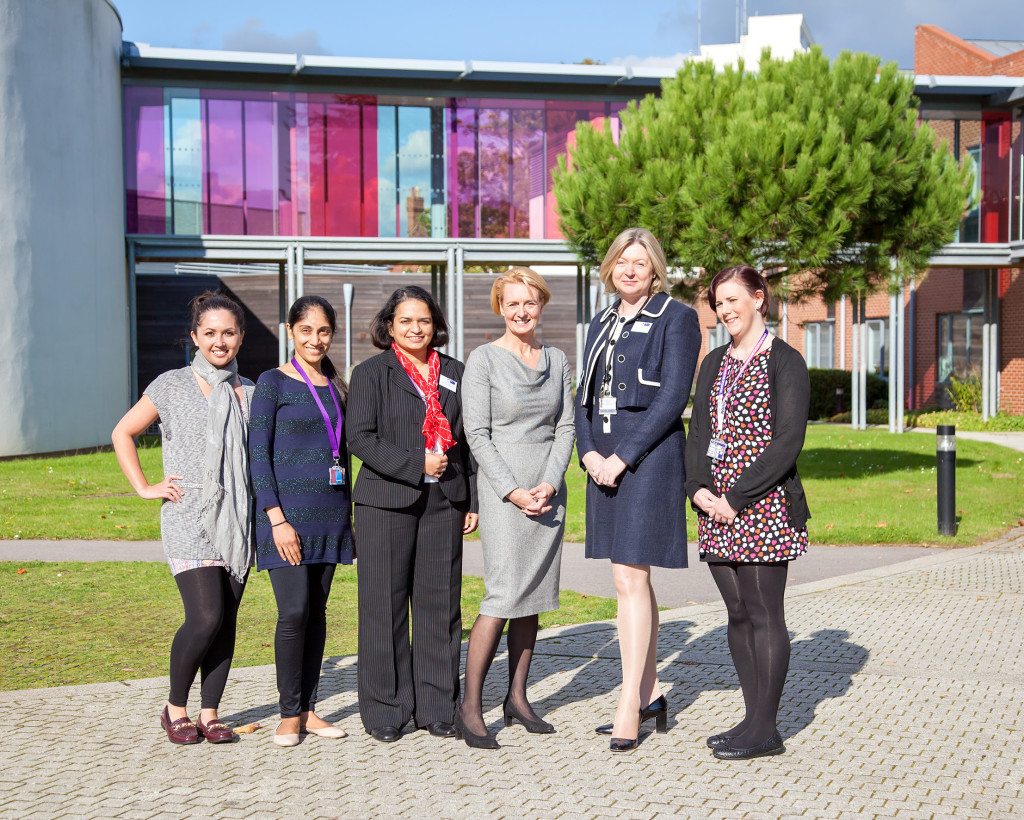
Who owns commissioning?
Despite popular misconception, the CDO does not ‘own’ NHS England commissioning of dental care. Whilst the CDO advises NHS England on the strategic direction for commissioning dental care and broader oral health initiatives in support of the NHS England Five Year Forward View health aspirations, decisions on what dental care is commissioned, how much is commissioned and allocation of contracts remains a local issue under the regional heads of primary care.
Regional leads work to the NHS England central commissioning team and the head of commissioning ops – primary care, David Geddes. The CDO provides clinical leadership and advice into this central team, identifying areas for quality improvement in commissioning and commissioned services. Alongside the obvious benefit to patients and the profession of having the CDO support the central commissioning team, Eric Rooney, the deputy CDO, now sits alongside David Geddes as the clinical dental advocate at the commissioning decision-making table.
Eric provides the profession with a tangible focal point at the strategic level, a natural endpoint for the clinical thread that starts with the dental care practitioner (DCP) that runs through the local professional networks and is supported by the nascent managed clinical networks.
Why did she take the role?
Sara explained: ‘The challenge was something new and offered an opportunity to contribute to change at the strategic level.’ Viewing NHS England with perhaps a different perspective from others, it was not necessarily evident to her where the strategic momentum was going to come from.
‘I believed that the profession desired and deserved change. I didn’t necessarily think that I was the natural candidate but when I was invited to throw my hat in the ring, maybe it was because I represented a new approach and encapsulated a new model of working. I presented a strategic vision for integrated oral health and dental care delivered through a more collaborative approach – I’d like to think that this ambition is slowly becoming a reality.’
The overall aim of dental care is improved oral health for all. There are a number of ways of accessing dentistry and even more ways of accessing oral health. They are not necessarily the same, but they have a lot of things in common.
Sara said: ‘My challenge at NHS England is to achieve what we have not managed yet…to integrate the dental care strategy with the oral health strategy. I recognise that Public Health England and the local health authorities can do much to improve oral health, but rather than delivering in silos, we could and should do it together.’
Sara proposes that we also need to think and operate outside our traditional professional boundaries; a culture change for all health and social care providers, but one that is fully aligned with the Five Year Forward View for NHS England.
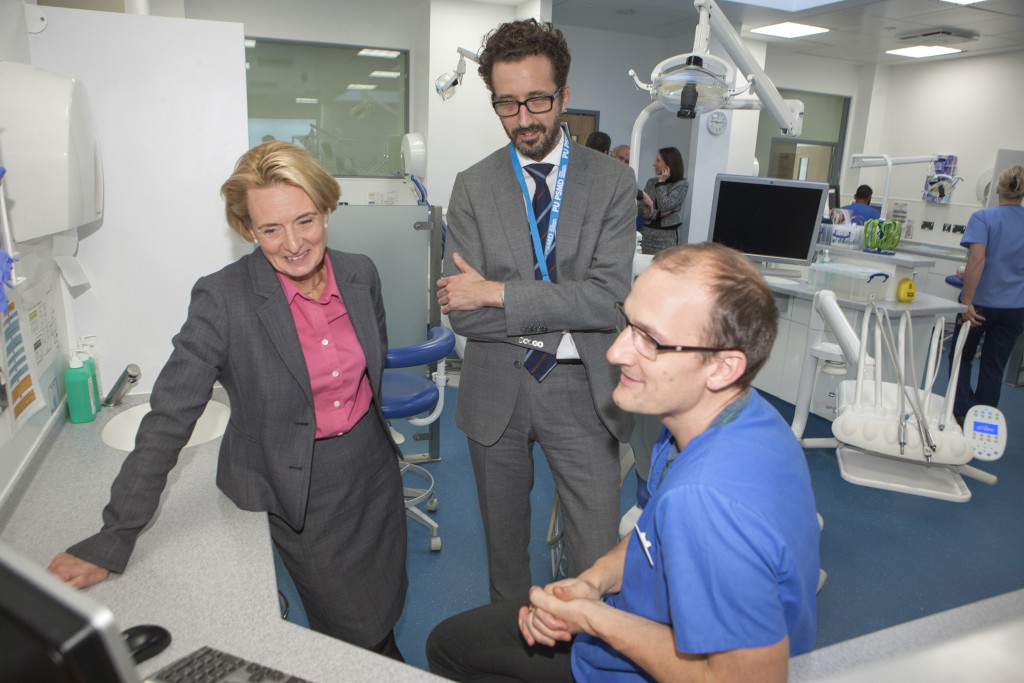
Strategy
The concept has now become more than a paper exercise and the CDO and the deputies have been busy ‘socialising’ the nascent integrated oral health and dental care strategy – a real sense of a new direction of travel for the profession and patients, a new integrated approach to commissioning dental care.
It was given its first formal outing at the LDC Conference last December and since then, together with Eric Rooney and Janet Clarke, the CDO has been spreading the word, gathering feedback, evolving the themes and recruiting support, and she is confident that she has a firm base from which to move forward.
BDA’s economics offer
In all this, the British Dental Association (BDA) has been extremely supportive and the CDO values the positive working relationship with the BDA executive and BDA members – after all she is a BDA member herself. The BDA’s generous offer to collaborate has been warmly received and most recently the association has offered to assist the office of CDO with some investigative health economic work and produce an evidence base to take to NHS England commissioning ops.
‘With the BDA’s sound analysis we can support our arguments for innovation in use of UDAs prior to contract reform and help shape contract reform’, Sara said.
Sara’s strategic vision for NHS England is to integrate an oral health and dental care strategy to improve oral health for all through broader access opportunities (both advice and treatment) as well as raising oral health on the agendas of other government departments and for individuals who are delivering both health and social care.
These groups include deliverers of Early Years initiatives, linking with charitable support for vulnerable groups, and closer to home, the NHS England Vanguard projects. All require a greater understanding that the mouth is intrinsically linked with the rest of the body – even if it is funded in a different way to the rest of the body.
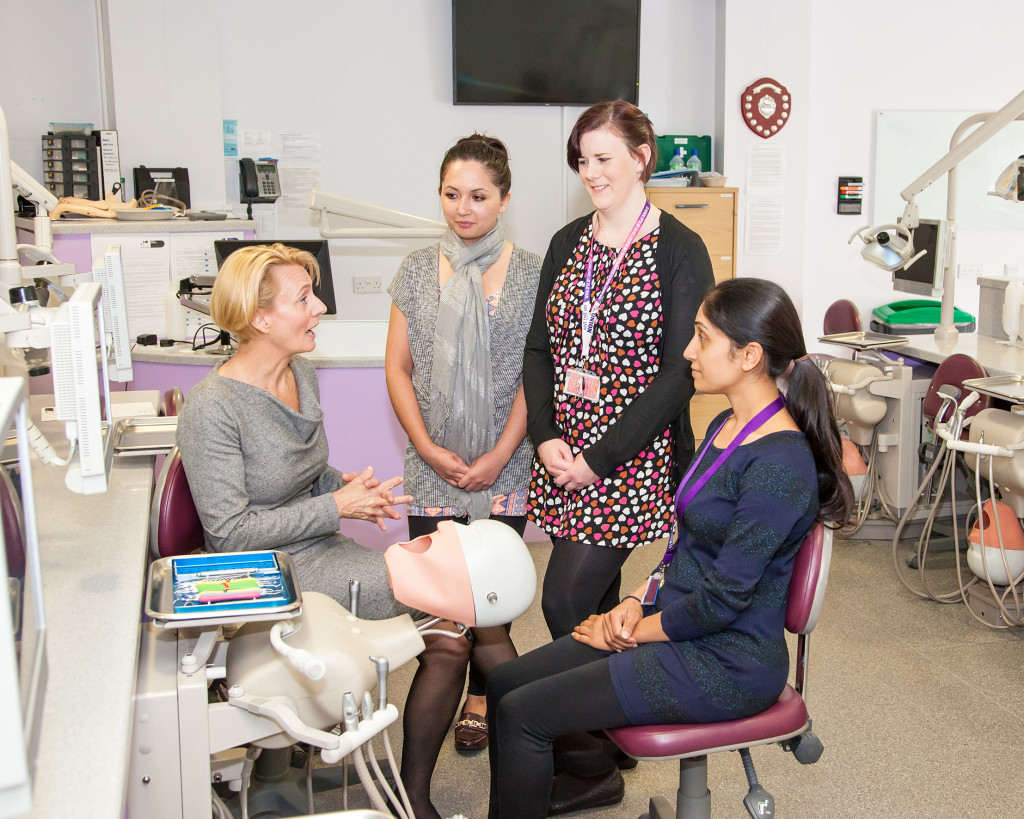
Sara Hurley visiting the University of Portsmouth Dental Academy
Sara observed: ‘I sense a real blind spot with other healthcare professionals – because it’s the mouth, anything related to it is considered almost exclusively the domain of the dental profession. I am clear that dental care is the responsibility of every healthcare professional from the health visitor to the GP, from the speech therapist to the physiotherapist.’
On top of all this patients have to contend with the barrier of patient charge/contribution for dentistry, and the outmoded UDA model doesn’t readily facilitate prevention. The CDO shares ‘the profession’s frustrations with the UDA system’ and continues to contribute to the Department of Health contract reforms process, along with the BDA representing the interests of the profession and patients.
With regards the Department of Health’s strategic intent for contract reform, it has to be evidence-based and ‘it absolutely has to have the profession looking at every part of the model, evaluating the blends and understanding the second order effects’. Sara says there continues to be an appetite to continue the process within NHS England and an appreciation that we must avoid the pitfalls of the implementation of the 2006 contract. The profession will need to understand that ‘we may have to sacrifice some momentum for the sake of quality evidence and thorough evaluation’ – for that Sara makes no apology.
The DH reports some 70-90 practices in the process of signing up to challenge and test out every angle of the prototype contracts for the benefit of the profession.
‘Over the next two to three years it will be paramount to find out what works and what does not – we owe it to our patients and the next generation of dental providers to get this as right as we can. No system is ever perfect or indeed remains perfect, we must ensure that the new “offer” is future proofed.’
‘When I was invited to throw my hat in the ring, maybe it was because I represented a new approach and encapsulated a new model of working’
As part of the evaluation process, the CDO expects every practice to be visited for a qualitative feedback process, which must be standardised. Sara has put her name down to do that.
She said: ‘I want to look at every practice that made the transfer from pilot to prototype and those that did not. For those that didn’t make the transition themselves or were not invited we need to understand the issues that prevented involvement, as these are as important as the indicators of success.’
At the end of the initial prototype roll out it will be for the DH to present its findings and then decide on what form of capitation is introduced, and funding and charging models, as well as length and format of registration. The CDO senses that ‘the DH has not trapped itself down one particular line or model and will make changes to get the contract reform right.’
Sara made it clear that the recommendations and advice from amongst others, Henrik Overgaard-Nielsen, Richard Emms, Martin Woodrow, Jimmy Steele, Eric Rooney and Sandra White, are all supporting the DH to consider the full implications of reform and the options open to the profession.
Oral health and child hospital admissions
Dentistry has been assured oral health is firmly on the agenda within the various offices at the DH, as well as NHS England. Sara acknowledges that the good news story that over the last 40 plus years we have, as a population, made great progress in improving our oral health, tends to overshadow the enduring pockets of health inequality.
Despite the efforts of many dedicated professionals, high levels of decay and poor oral health persist in around a third of our population. Dental decay steadfastly remains the number one reason for children being admitted to hospital. During 2013-14, approximately 46,500 children and young people under 19 were admitted to hospital for a primary diagnosis of dental caries. Over 25,500 of these were children between five and nine years old. As well as the emotional cost, this entirely preventable disease is costing over £30 million a year for hospital-based tooth extractions.
‘Whatever your perspective…why is the public not outraged about this?’ says Sara. ‘Because they should be’.
The majority of parents and carers do know about the benefits of regular brushing of their child’s teeth with fluoride toothpaste and are able to act on the advice for a third of England’s children. However, for some there appears to be real barriers to choosing to adopt the norm or do the right thing. Understanding the myriad of factors that affect whether these groups receive a health message, or more often why they do not or cannot put the health messages into action, is complex.
Sara’s quest is to make ‘the healthy choice the easy choice, one that doesn’t require too much thought.’ But this will require more than just mastering the interaction between the healthcare professional and the patient. There is cultural phenomenon we need to understand and that requires the expertise of the sociologist or anthropologist and a multi-disciplinary approach to ‘nudge’ people towards healthier lifestyle choices for themselves and those they care for.
Sara applauds and supports Jamie Oliver’s amazing endeavours and suggests that part of the approach may be to have an oral health role model – she proposes David Beckham, a universally recognised individual that crosses all age ranges, a fantastic role model for family, health and looking after yourself. Given his smile and those of his children he clearly understands the value of having a good relationship with his family dental practice.
‘If David were to front an oral health campaign he could transform attitudes and thinking about oral health in the UK for the benefit of millions’, she said.
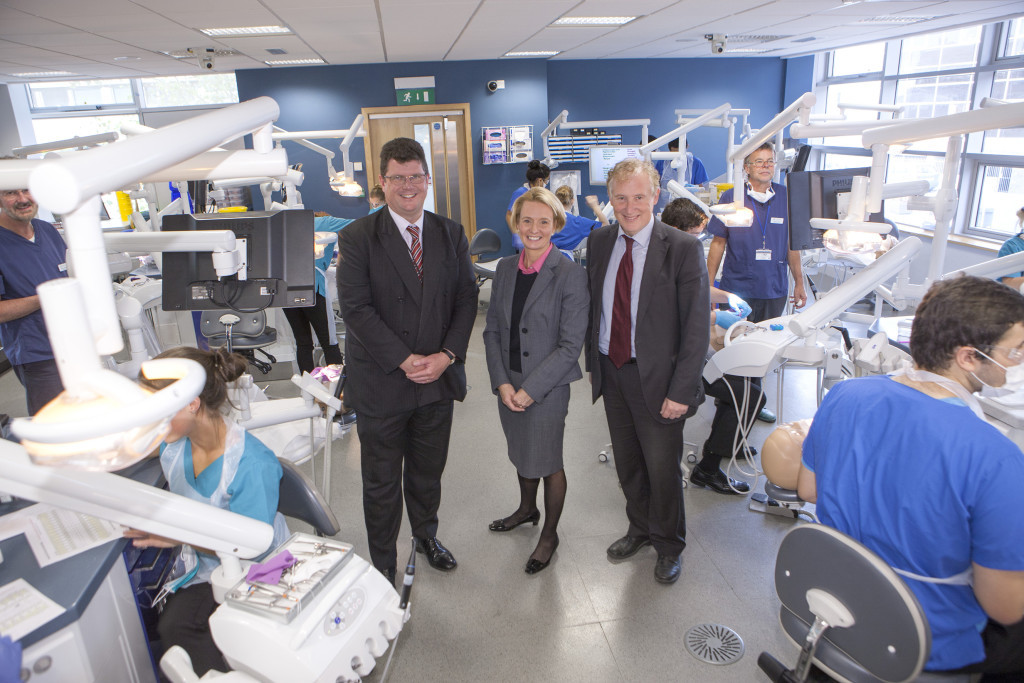
The CDO executive team
Whilst Sara doesn’t have David Beckham’s agent on speed dial, she is focused on taking the integrated strategy forward.
Working with Janet Clarke and Eric Rooney, as a team of equals the CDO executive team is supported by a growing volunteer group of enthusiastic professionals. The recent addition of a clinical fellow to the office of CDO is an innovation designed to improve opportunities to develop the next generation of strategic operators and deliverers.
Sara would like to expand the team further with a DCP as a clinical fellow, or maybe bring someone in from the academic, research or corporate world on sabbatical. Sadly the reality is that she has limited funding but would welcome support from other organisations – perhaps a dental publisher or the British Dental Industries Association – in sponsoring a clinical fellow.
In short there are opportunities for other stakeholders or agencies to place or sponsor a fellow within the office of CDO England. It is hoped that through these opportunities we can develop an even broader and deeper pool of talent and maybe the next CDO will emerge from this initiative.
Clearly, this is part of a wider-ranging plan, and as a long-term strategist Sara is already setting the conditions for success.
General Dental Council concerns
‘The GDC recognises there are things they could be doing better’, said Sara, and she welcomes the advent of Jonathan Green and Mathew Hill and senses a more positive future for the GDC’s relationship with the profession. She detects the green shoots of a transformational shift and is hopeful that this will continue once the new GDC chief executive is appointed.
In looking for a credible candidate to replace Evlynne Gilvarry, Sara hopes that the GDC may wish to consider the merits of appointing someone from the clinical professions. This would not be a new departure – as Professor Nairn Wilson admirably demonstrated – there is real value in having a clinician in such a pivotal role.
There are several names with the relevant expertise and kudos that can build on the current progress at the GDC – we can only hope that at least one of them will have grasped the nettle and applied.
Sara’s ethos when in practice
Sara’s approach to teamwork and engagement is based on her 16 plus years’ experience in general dental practice. ‘We always had a reflective meeting at the end of the day. I, the DCP and practice manager would review how many patients we had seen; how many people we had made dentally fit and critically assess performance.
Similarly, ‘we would start our morning session in the staff coffee room before the first patient, discussing what was going to happen that day, making sure all the team were present and correct, discussing any potential problems with patients, potential failures to attend, patients who we expected to run late and so on.
‘The point is although we all had separate areas of responsibility, it was only when individuals were working as a team that we could truly delivery greater benefit to our patients and the practice.’
Sara recalled a senior military dentist she used to work for – Mike Kasasian – who was renowned for motivating his dental team each morning, sending them out into the clinic with his Russell Crow Gladiator impression: ‘On my command, unleash health!’ She said: ‘Super-motivated and enthused, we would willingly cover for each other, clearing up someone else’s surgery while someone took a break and so on; working hard but happy.
‘I know this was not unique to my environment, there are many other practices out there who do the same…but it is this very ethos and energy that will transform our workforce.’
Information preparation for the battlefield
Having taken the concept of ‘information preparation for the battlefield’ from her previous life, Sara has a deep understanding about the people, environments and economics of the varied dental care landscape. She has clearly done her homework on awards schemes, including The Dentistry Awards and the BDA’s good practice scheme.
Whilst she has well-developed antennae for news and issues of the day she has currently declined all invitations to be an active presence on internet forums or social media. ‘If I went on one, I would have to contribute to all and I would not have enough time to do my day job’.
Sara agrees that social media has its merit and is good for a respectful exchange of ideas but is also open to misinterpretation and misquoted soundbites.
For the CDO, she sees the optimal use of her time is to focus on producing well-articulated cases supported by evidence not assertion, and ensuring that they get heard by the appropriate authorities at the DH and NHS England.
Conclusions
The former chief dental officer was an avid football fan and it was pleasantly surprising to discover that apart from David Beckham, Sara also has an interest in the beautiful game – her favorite footballer is Roy Race, the British comic strip football player who played for Melchester Rovers in the comic strip Roy of the Rovers.
So what we have is a CDO with longer-term strategic vision, real ambition for the profession and a well-tuned sense of humour. Enthusiastic and energetic about the profession and its role in improving oral health in England, she hopes that the profession will back the aspiration to place clinical expertise alongside the commissioners and assist in the strategic and local redesign of commissioning intent.
Regarding children being admitted to hospital for extractions, she is taking a critical look at what is happening and is working across a variety of health and political boundaries for investment of time and money.
Clearly much can be done at local level and much can be led by the dental team, but it must be joined up – isolated endeavours are limited in aspiration and ultimately outcome.
‘Sara’s quest is to make “the healthy choice the easy choice, one that doesn’t require too much thought”‘
Pressing ahead with contract reforms, the CDO will support the prototypes and critically evaluate in order to appreciate the options. She wants to engage and work closely with the various stakeholders to investigate alternatives in future contracts across general dental practice and the dental specialties.
It is clear throughout our conversation that the CDO understands what’s happening in practice, whether that be on the high street, in the community or with a corporate, as well as life in secondary healthcare, academia and the research arenas.
She wants to future proof the profession’s partnership with NHS England with pragmatic counsel as we move towards contract reform. ‘This is vital if we are to achieve a model of capitation and registration that will allow us to have an enduring relationship with our patients’.
Dentistry likes much of what the new CDO is saying about commissioning and having a dental clinician operating within the commissioning department – this is surely of great benefit to the profession in the future. We have some good first steps; the CDO acknowledges that for the profession it is a mere seven months of a new CDO and we have a long way to go before we can truly judge success, but we have a road map and a group of fellow travellers of great ability and talent that can assist in our tasks ahead.
She ended by saying: ‘I truly welcome the opportunity to represent our profession and serve our patients – I do not take my responsibilities lightly’. Her ambition for the profession is clearly matched by a commitment and energy.
Sara Hurley BDS(UBrist) MFGDP(UK) MSc(UCL) MA(KCL) career has flexed across dental public health, wider healthcare policy and healthcare commissioning. She was announced as the chief dental officer for England in April 2015.
Sara Hurley will be speaking at the MID Symposium in London on 30 September 2016. This year’s symposium aims to give members of the oral healthcare team real-life experience and tips on how to practically implement the minimum intervention strategy in the NHS, for the benefit of patients and practitioners. For more information, call 0845 1841 498.


